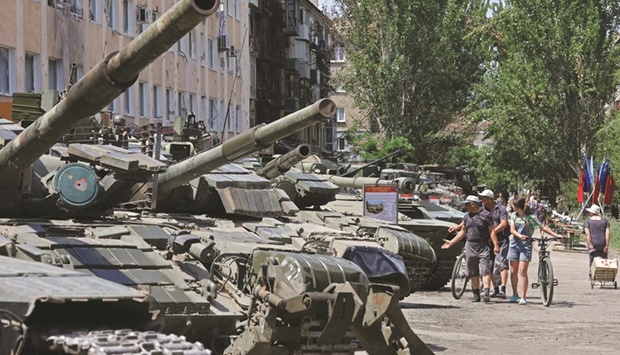Ukraine’s allies urged Russia yesterday to allow Kyiv to ship blockaded grain out to an increasingly hungry world, as a belligerent Moscow warned Western nations against attempts to enact reprisals over an invasion now well into its fifth month.
Signalling that the Kremlin was in no mood for compromise, President Vladimir Putin said that continued use of sanctions against Russia risked causing “catastrophic” energy price rises, and his top diplomat clashed with his Western counterparts at a G20 meeting.
As Ukraine called on allies to step up deliveries of high-precision weapons to slow Russia’s advance, Moscow’s envoy to London offered little prospect of a pull-back from parts of Ukraine under Russian control.
Ambassador Andrei Kelin told Reuters that Russian troops would capture the rest of the eastern Donbas region and were unlikely to withdraw from land across the southern coast.
Ukraine would eventually have to strike a peace deal or “continue slipping down this hill” to ruin, he said.
On the Donbas frontlines, Ukrainian officials reported Russian shelling of towns and villages ahead of an anticipated push for more territory.
On Thursday, Putin had indicated that current prospects of finding a solution to the conflict were dim, saying that Russia’s campaign in Ukraine had barely got started.
Kelin’s remarks gave an insight into Russia’s potential endgame – a forced partition that would leave its former Soviet neighbour shorn of more than a fifth of its post-Soviet territory.
“We are going to liberate all of the Donbas,” Kelin said. “Of course it is difficult to predict the withdrawal of our forces from the southern part of Ukraine because we have already experience that after withdrawal, provocations start.”
An escalation of the war was possible, he added.
Ukrainian officials said they needed more high-grade Western weapons to shore up defences.
Oleksiy Danilov, secretary of the National Security and Defence Council, said that Ukraine still did not have enough Western weapons and soldiers needed time to adapt to using them.
Kyiv has attributed battlefield successes to last month’s arrival of US-made High Mobility Artillery Rocket Systems (HIMARS).
“When they came in, the Russian war machine could instantly feel its effect,” Danilov told Reuters.
However, receiving more Western military aid was vital.
President Volodymyr Zelensky’s chief of staff also urged the West to send more heavy weapons to counter what he called Russia’s “scorched earth tactics”.
“With a sufficient number of howitzers, SPG and HIMARS, our soldiers are able to stop and drive the invaders from our land,” Andriy Yermak wrote on Twitter.
At the meeting of G20 foreign ministers in Bali, Indonesia, some of the staunchest critics of the invasion that began on February 24 confronted their Russian counterpart, Sergei Lavrov.
High on their list of concerns was getting grain shipments from Ukraine out through ports blocked by Russia’s presence in the Black Sea and naval mines.
Ukraine is a leading exporter and aid agencies have warned that many developing countries face devastating food shortages if supplies fail to reach them.
US Secretary of State Antony Blinken urged Moscow to let Ukrainian grain out, a Western official said.
“He addressed Russia directly, saying: ‘To our Russian colleagues: Ukraine is not your country. Its grain is not your grain. Why are you blocking the ports? You should let the grain out,’” the official said.
A US State Department official later said that Blinken had told the meeting participants that, if the G20 was to remain relevant, it must hold Russia accountable for its military’s actions in Ukraine.
The biggest conflict in Europe since World War II has killed thousands, displaced millions and flattened Ukrainian cities.
Russia calls it a “special military operation” intended to degrade Ukraine’s military and root out people it sees as dangerous nationalists.
Ukraine and its Western allies say Russia is engaged in an unprovoked land grab.
Russian forces have seized a big chunk of territory across Ukraine’s southern flank and are waging a war of attrition in the Donbas, the eastern industrial heartland made up of Luhansk and Donetsk provinces.
Luhansk’s governor said yesterday that Russian forces were indiscriminately shelling populated areas.
“They are not stopped even by the fact that civilians remain there, dying in houses and yards,” Serhiy Gaidai he said.
The situation was similar in settlements in Donetsk.
Moscow said on Sunday that it had “liberated” Luhansk and now plans to capture parts of the Donetsk region it does not already control.
Reuters could not independently verify the battlefield accounts.
Meanwhile, a Moscow court has sentenced a city councillor to seven years in prison for denouncing Putin’s military intervention in Ukraine.
Alexei Gorinov, 60, is the first elected member of the opposition to be sentenced to jail for criticising Moscow’s military campaign in Ukraine.
He was found guilty yesterday of spreading “knowingly false information” about the Russian army.
Standing handcuffed in the glass defendant’s box, grey-haired Gorinov in a checked shirt unfolded a piece of paper that read: “Do you still need this war?”
Much of the courtroom stood in applause as he held the paper against the glass.
“This was all decided before,” he said as he was handed the prison term.
Gorinov is accused of discrediting the Russian army under strict legislation that rights activists say is part of Moscow’s increasing efforts to snuff out the last vestiges of dissent.
He spoke up against Moscow’s military intervention in Ukraine during a work meeting in March that was recorded on video and is available on YouTube.

Local residents view Ukrainian army hardware and weapons left in Lysychansk city in Luhansk region, after its withdrawal during Ukraine-Russia conflict.
